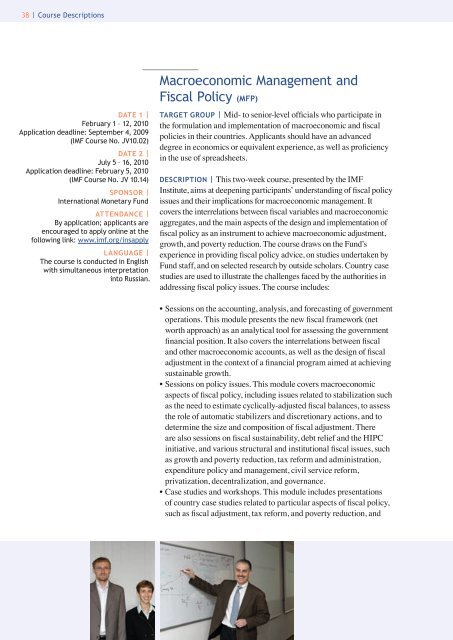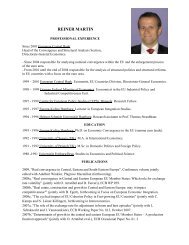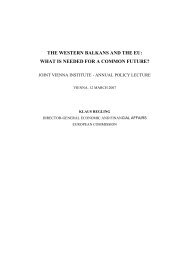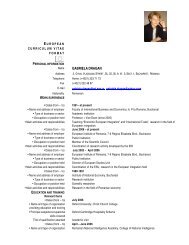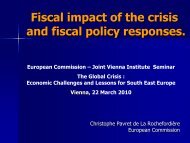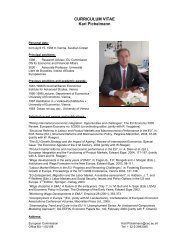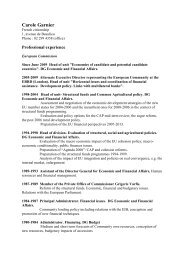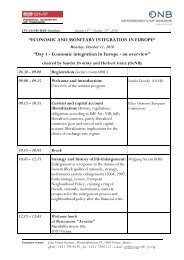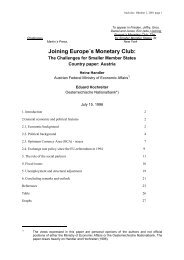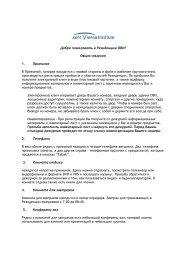Program 2010 - Joint Vienna Institute
Program 2010 - Joint Vienna Institute
Program 2010 - Joint Vienna Institute
- No tags were found...
You also want an ePaper? Increase the reach of your titles
YUMPU automatically turns print PDFs into web optimized ePapers that Google loves.
38 | Course Descriptions<br />
Date 1 |<br />
February 1 – 12, <strong>2010</strong><br />
Application deadline: September 4, 2009<br />
(IMF Course No. JV10.02)<br />
Date 2 |<br />
July 5 – 16, <strong>2010</strong><br />
Application deadline: February 5, <strong>2010</strong><br />
(IMF Course No. JV 10.14)<br />
Sponsor |<br />
International Monetary Fund<br />
Attendance |<br />
By application; applicants are<br />
encouraged to apply online at the<br />
following link: www.imf.org/insapply<br />
Language |<br />
The course is conducted in English<br />
with simultaneous interpretation<br />
into Russian.<br />
Macroeconomic Management and<br />
Fiscal Policy (MFP)<br />
Target group | Mid- to senior-level officials who participate in<br />
the formulation and implementation of macroeconomic and fiscal<br />
policies in their countries. Applicants should have an advanced<br />
degree in economics or equivalent experience, as well as proficiency<br />
in the use of spreadsheets.<br />
description | This two-week course, presented by the IMF<br />
<strong>Institute</strong>, aims at deepening participants’ understanding of fiscal policy<br />
issues and their implications for macroeconomic management. It<br />
covers the interrelations between fiscal variables and macroeconomic<br />
aggregates, and the main aspects of the design and implementation of<br />
fiscal policy as an instrument to achieve macroeconomic adjustment,<br />
growth, and poverty reduction. The course draws on the Fund’s<br />
experience in providing fiscal policy advice, on studies undertaken by<br />
Fund staff, and on selected research by outside scholars. Country case<br />
studies are used to illustrate the challenges faced by the authorities in<br />
addressing fiscal policy issues. The course includes:<br />
• Sessions on the accounting, analysis, and forecasting of government<br />
operations. This module presents the new fiscal framework (net<br />
worth approach) as an analytical tool for assessing the government<br />
financial position. It also covers the interrelations between fiscal<br />
and other macroeconomic accounts, as well as the design of fiscal<br />
adjustment in the context of a financial program aimed at achieving<br />
sustainable growth.<br />
• Sessions on policy issues. This module covers macroeconomic<br />
aspects of fiscal policy, including issues related to stabilization such<br />
as the need to estimate cyclically-adjusted fiscal balances, to assess<br />
the role of automatic stabilizers and discretionary actions, and to<br />
determine the size and composition of fiscal adjustment. There<br />
are also sessions on fiscal sustainability, debt relief and the HIPC<br />
initiative, and various structural and institutional fiscal issues, such<br />
as growth and poverty reduction, tax reform and administration,<br />
expenditure policy and management, civil service reform,<br />
privatization, decentralization, and governance.<br />
• Case studies and workshops. This module includes presentations<br />
of country case studies related to particular aspects of fiscal policy,<br />
such as fiscal adjustment, tax reform, and poverty reduction, and


